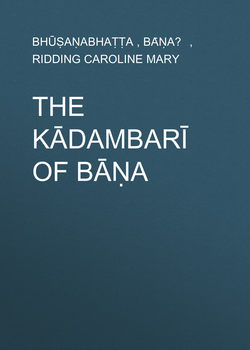Читать книгу The Kādambarī of Bāṇa - Bhūṣaṇabhaṭṭa - Страница 3
INTRODUCTION.1
The Author
ОглавлениеBāṇabhaṭṭa, its author, lived in the reign of Harshavardhana of Thāṇeçar, the great king mentioned in many inscriptions,2 who extended his rule over the whole of Northern India, and from whose reign (A.D. 606) dates the Harsha era, used in Nepal. Bāṇa, as he tells us, both in the ‘Harsha-Carita’ and in the introductory verses of ‘Kādambarī,’ was a Vātsyāyana Brahman. His mother died while he was yet young, and his father’s tender care of him, recorded in the ‘Harsha-Carita,’3 was doubtless in his memory as he recorded the unselfish love of Vaiçampāyana’s father in ‘Kādambarī’ (p. 22). In his youth he travelled much, and for a time ‘came into reproach,’ by reason of his unsettled life; but the experience gained in foreign lands turned his thoughts homewards, and he returned to his kin, and lived a life of quiet study in their midst. From this he was summoned to the court of King Harsha, who at first received him coldly, but afterwards attached him to his service; and Bāṇa in the ‘Harsha-Carita’ relates his own life as a prelude to that of his master.
The other works attributed to him are the ‘Caṇḍikāçataka,’4 or verses in honour of Caṇḍikā; a drama, ‘The Pārvatīpariṇaya’; and another, called ‘Mukuṭatāḍitaka,’ the existence of which is inferred from Guṇavinayagaṇi’s commentary on the ‘Nalacampū.’ Professor Peterson also mentions that a verse of Bāṇa’s (‘Subhāshitāvali,’ 1087) is quoted by Kshemendra in his ‘Aucityavicāracarcā,’ with a statement that it is part of a description of Kādambarī’s sorrow in the absence of Candrāpīḍa, whence, he adds, ‘it would seem that Bāṇa wrote the story of Kādambarī in verse as well as in prose,’ and he gives some verses which may have come from such a work.
Bāṇa himself died, leaving ‘Kādambarī’ unfinished, and his son Bhūshaṇabhaṭṭa took it up in the midst of a speech in which Kādambarī’s sorrows are told, and continued the speech without a break, save for a few introductory verses in honour of his father, and in apology for his having undertaken the task, ‘as its unfinished state was a grief to the good.’ He continued the story on the same plan, and with careful, and, indeed, exaggerated, imitation of his father’s style.
2
E.g., the Madhuban grant of Saṃ 25, E. I. i., 67 ff. For this and other chronological references I am indebted to Miss C. M. Duff, who has let me use the MS. of her ‘Chronology of India.’
3
For Bāṇa’s early life, V. ‘Harsha-Carita,’ chs. i., ii. I have to thank Mr. F. W. Thomas for allowing me to see the proof-sheets of his translation.
4
Peterson, ‘Kādambarī,’ pp. 96–98; and ‘The Subhāshitāvali,’ edited by Peterson (Bombay Sanskrit Series, 1886), pp. 62–66.
